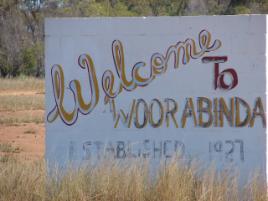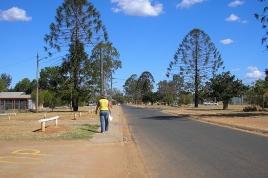Alcohol ban gives community's health a boost
Published on 11 September, 2008
BY student reporter JESSICA FARLEY.
The Government's plan to provide the community of Woorabinda with additional health services is well underway since the town went dry on the 1st of July this year.
 The indigenous community of Woorabinda elected to go dry in an attempt to overcome the town's escalating crime rate and widespread health and social problems.
The indigenous community of Woorabinda elected to go dry in an attempt to overcome the town's escalating crime rate and widespread health and social problems.
Director of Nursing at Woorabinda Hospital, Robert Cody, said that the Government is providing the town with additional support to help overcome the immediate and future consequences of the alcohol ban.
Cody said that once the alcohol ban became official, interim measures were put in place. "Currently there are detox services in operation. Ward 5 of the hospital is dedicated to detoxification."
The hospital is in the process of assembling a full team of health care professionals to help ease the town's transition to a successful dry community.
"We are currently securing new employees and will have a team leader ready to begin on the 1st of September. We will also have a clinical nurse, two health professionals and residential carers" Cody said.
In addition to the services already provided for the community, a sobering up facility will be available for public use in November.
Cody said that a rehabilitation centre would not be ready until December 2010.
Despite the availability of the new detoxification services, Cody said that not many community members have made use of the facilities.
"The demand for service isn't great. But with greater facilities will come greater demand."
 Since the alcohol ban, Cody has noticed that the rate and type of medical presentations to the hospital has changed dramatically.
Since the alcohol ban, Cody has noticed that the rate and type of medical presentations to the hospital has changed dramatically.
Cody said that although it is only early days, he believes that the alcohol ban has played a role in the positive changes that he has seen in the health of the small community.
"We've had less presentations of violent assaults and alcohol affected people. We've also seen a significant reduction in alcohol related problems such as abdominal pain."
On another positive note Cody commented that there has been a drop in incidences of violence in public and that there are fewer young people roaming the streets at night.
These positive results coupled with past alarming health and crime statistics highlight the reason for the former Woorabinda Council's push for tighter alcohol restrictions.
The Minster for Aboriginal Partnerships, Lindy Nelson-Carr, backed Woorabinda's landmark decision to go dry on the basis that the town's assault average is 28 times higher than for communities of similar size elsewhere in Queensland.
Woorabinda's Justice Group also firmly supported the decision stating that indigenous people have a much higher mortality rate than that of their white counterparts.
The Secretary of Woorabinda's Justice Group, Neola Savage, said that ‘our people die at a very early age, 40 to 50 years old.'
With the alcohol ban now firmly in place, Cody has noted that not all of the outcomes have been positive.
"Unfortunately, we have seen the price of sly grog increase and a high rise in the intake of Methylated Spirits."
He has also observed that a minority of community members who are trying to avoid the alcohol ban are leaving the restricted area and forming drinking camps in the surrounding bush.
Cody said that he is not concerned with policing the alcohol ban. Rather that as a health service provider, it is his duty to reduce and prevent harm caused by alcohol intake.
As health services in Woorabinda continue to increase, Cody is confident that a greater number of people will seek treatment.
"I have noticed a positive change in the health of the community. Whether it is from the alcohol ban or something else, I don't know. I think it is too early to tell. But something positive is happening."

